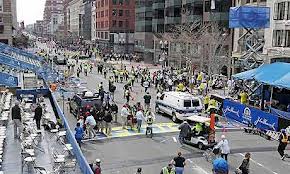“We are one brief generation in the long march of time; the future is not ours to erase.”
from the Declaration of Interdependence


from the Declaration of Interdependence

By now, the news video is seared indelibly into our memories. A flash, a boom, a billow of smoke. Runners tumble to the pavement. Emergency personnel race into action. On stretchers, on makeshift carts, sometimes in their arms, they carry injured and maimed victims to medical care.
This was, of course, the Boston marathon, 2013.
For once, the mainly U.S. media showed commendable restraint. They did not rush to blame foreign terrorists, Islamist fanatics, or world-government conspiracies.
Unfortunately, most of them also did not put the Boston bombings into any kind of context. One of the few who did was Erin Niemela of the Common Dreams alternative news network. “Americans will remember Monday, April 15, 2013 as a day in which unspeakable violence took the lives of three people and wounded at least 153 after bombs exploded at the Boston Marathon finish line,” she wrote.
“Thousands of miles away, Iraqis will remember this same Monday as a day in which violence claimed the lives of at least 31 people and over 200 injured after multiple car bombs detonated in Iraq’s capital, Baghdad, and several other areas. Afghans will remember this Monday as a day in which a ghastly roadside bomb in the Zabul province killed seven and wounded four other human beings.” And these, Niemela concluded, are only the deaths documented by the news media for a single morning.
HISTORIC TRENDS
That’s the paradox of the modern world. The news is filled with what Niemela called “unspeakable violence.” And yet scholars like Stephen Pinker argue that violence is decreasing.
In his 2012 book, The Better Angels of our Nature, Pinker documents exhaustively the likelihood of people dying in violence. Essentially, he argues that in past centuries, the vast majority of humans could expect to die violently — whether from local quarrels, repression by their rulers, or invading armies.
Today, by contrast, most people can expect to die in their beds, of old age or illness.
We may be living, he asserts, in the most peaceful times our species has known.
Now, you may not agree with Pinker’s thesis. Certainly, his book has received some scathing reviews. But it’s hard to challenge over 700 pages of graphs, charts, and statistics.
I think he’s right. When I consider the utterly mindless cruelty perpetrated in past years in the name of God and King (or any regional equivalent to those terms) I consider myself fortunate to live today and not during the centuries when human life was, in the words of philosopher Thomas Hobbes, “nasty, brutish, and short.”
In North America, official police statistics tend to support Pinker’s view. The incidence of violent crime has been steadily decreasing.
LESS VIOLENCE, MORE VIOLENTLY
And yet the crimes themselves become steadily more violent. Think of the massacres at Sandy Hook Elementary in Connecticut, Columbine High in Colorado, Virginia Tech, the theatre in Aurora, Colorado… Think of Timothy McVeigh’s bombing of the federal office building in Oklahoma City, or the fiery deaths in Waco, Texas…
What has happened, I suggest, is that even as our cultural reliance on violence has declined, the technology that enables violence has improved.
Alfred Nobel, the inventor of dynamite and its successor gelignite, foresaw this possibility. He made explosives safer to handle; he also greatly increased their power. After a French newspaper labelled him “the merchant of death,” Nobel established his Peace Prize as an intellectual counterpoint to his contribution to destruction.
Attila the Hun’s horsemen were legendary for their ruthlessness. But even they could only kill one person at a time. And that person could fight back — sometimes successfully.
Today’s killing technology, by contrast, let an Adam Lanza murder 26 cowering victims with an assault rifle. Timothy McVeigh caused 168 deaths with a single truck bomb. A paranoid Osama bin Laden — if, in fact, he did mastermind the September 11, 2001 attacks — destroyed the World Trade Center and 3000 human lives.
Not even Attila’s hordes achieved the killing capability of ballistic missiles, remotely controlled drones, or nuclear bombs. Reliable statistics are hard to find, but one group claims that the U.S. has carried out 422 strikes in Pakistan and Yemen alone, the majority by remotely oontrolled drones, resulting in roughly 3,000 deaths.
INVISIBLE ENEMIES
And that’s what makes modern killing technology — including the bombs at Boston — so terrifying. The victims never know who hit them. Or why. They cannot confront their attackers.
By the time an improvised explosive device detonates, or a drone completes its “surgically precise” mission, the perpetrators could be miles away in the local Starbucks enjoying a cup of coffee.
Car bombs don’t choose who they’re going to maim. Drones have a specific target — we’re told — but have no idea who else may be present. The gunmen in Newtown, Aurora, Virginia Tech, and Fort Hood didn’t care who they shot — they killed for the sake of killing.
Did Harry Truman know even one of the 100,000 or so people he incinerated in Hiroshima?
We have all become “collateral damage.”
That’s what makes the Boston bombings (and their more sophisticated kin) so disturbing.
*****************************************
 “For all of us, social justice is about how to think and act with others to support conditions where one’s own and others’ well-being are simultaneously possible.”
“For all of us, social justice is about how to think and act with others to support conditions where one’s own and others’ well-being are simultaneously possible.”

 Get a FREE trial issue of Sojourners Get a FREE trial issue of Sojourners |
Donate Today! |
 |
This was originally posted by Ted Schmidt on his blog: Theology in the Vineyard:Sport as tool of corporate ideologyby Ted Schmidt |